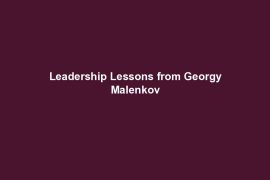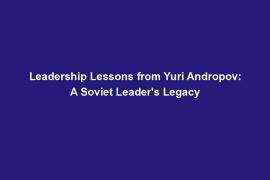Hey there, history buffs and leadership enthusiasts! Today, we’re diving into the fascinating world of Vyacheslav Molotov, a key figure in Soviet leadership during World War II. You might recognize his name from the infamous Molotov-Ribbentrop Pact, but there’s so much more to learn about his diplomatic and strategic prowess.
Studying Molotov’s leadership style can offer valuable insights into the art of diplomacy and strategy. By dissecting his decision-making processes and analyzing his interactions with world leaders, we can uncover a treasure trove of lessons to apply to our own leadership journeys.
So, buckle up and get ready to explore the leadership lessons we can draw from Vyacheslav Molotov’s tenure in Soviet leadership during one of the most tumultuous times in modern history. Let’s uncover the qualities that made him a formidable leader, such as resilience, adaptability, and assertiveness, and see how we can incorporate these traits into our own leadership approaches. Stay tuned for an eye-opening adventure into the world of historical leadership and its relevance to the modern-day. Exciting stuff ahead!
Leadership Lessons from Vyacheslav Molotov
Alright, now that we’ve covered the basics, let’s dive into the juicy stuff – the leadership lessons we can learn from Vyacheslav Molotov himself. This guy was a key player in Soviet leadership during World War II, so you know he’s got some valuable insights to offer.
First up, let’s talk about Molotov’s diplomatic tactics. One of the most famous moves he made was the Molotov-Ribbentrop Pact, a non-aggression agreement between the Soviet Union and Nazi Germany. This pact bought the Soviets some time to prepare for what was to come, showing us the importance of strategic thinking in diplomacy.
But Molotov wasn’t just about making deals – he was also a master negotiator. His talks with world leaders like Winston Churchill and Franklin D. Roosevelt were crucial in shaping the course of the war. By studying how he handled these high-stakes discussions, we can learn a thing or two about effective communication and building strong relationships.
Next, let’s take a look at Molotov’s strategic decision-making. As Foreign Minister, he played a key role in shaping Soviet foreign policy and military strategy. His ability to adapt to changing circumstances, like when the Germans invaded in 1941, showcased his resilience and quick thinking under pressure.
Overall, Molotov demonstrated key qualities of leadership such as resilience, adaptability, and assertiveness. These are all traits that we can aspire to incorporate into our own leadership styles, whether we’re negotiating a business deal or navigating a challenging situation at work.
Applying Molotov’s Lessons to Modern Leadership
Now, you might be wondering – how can we apply Molotov’s leadership lessons to our own lives? Well, think about it this way: the world may have changed since his time, but the fundamentals of leadership remain the same.
By drawing parallels between Molotov’s leadership style and that of current world leaders, we can gain a fresh perspective on how to tackle contemporary diplomatic and strategic challenges. Whether you’re a CEO, a team leader, or just someone looking to improve their leadership skills, there’s something to be learned from studying the greats like Molotov.
So, next time you find yourself faced with a tough decision or a tricky negotiation, remember the lessons of Vyacheslav Molotov. His resilience, adaptability, and assertiveness can serve as a guide for anyone looking to lead with confidence and clarity.
Applying Molotov’s Lessons to Modern Leadership
Now that we’ve delved into the leadership lessons we can learn from Vyacheslav Molotov, let’s explore how his strategies and tactics can be applied to modern leadership in today’s world.
Relevance to Contemporary Diplomatic and Strategic Challenges
In today’s complex global landscape, leaders are faced with a myriad of diplomatic and strategic challenges. By studying Molotov’s leadership style, we can gain insights into how to navigate these challenges effectively. For example, his ability to negotiate with world leaders and shape foreign policy can serve as a blueprint for modern leaders facing similar situations. By understanding the nuances of diplomatic tactics and strategic decision-making employed by Molotov, leaders can adapt and thrive in today’s ever-changing environment.
Parallel with Current World Leaders
It’s fascinating to draw parallels between Molotov’s leadership and that of current world leaders. By examining the qualities of resilience, adaptability, and assertiveness that Molotov exhibited, we can see how these traits are still relevant in today’s leaders. Whether it’s dealing with political adversaries, navigating international conflicts, or implementing policies, the lessons from Molotov’s leadership can resonate with leaders across various fields and industries.
Practical Tips for Incorporating Molotov’s Lessons
So, how can you incorporate Molotov’s lessons into your own leadership approach? One practical tip is to study history and learn from past leaders like Molotov. By reflecting on their successes and failures, you can gain valuable insights that can inform your decision-making processes. Additionally, practicing resilience, adaptability, and assertiveness in your leadership style can help you navigate challenges and seize opportunities effectively.
In conclusion, studying Vyacheslav Molotov’s leadership can provide us with valuable lessons that are applicable to modern leadership. By understanding his diplomatic tactics, strategic decision-making, and key qualities of leadership, we can enhance our own leadership skills and navigate the complexities of our ever-changing world. Let’s reflect on our own leadership styles, learn from historical figures like Molotov, and strive to become better leaders in our own right.



